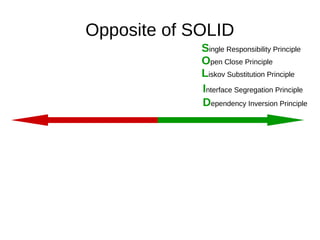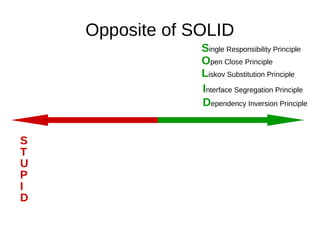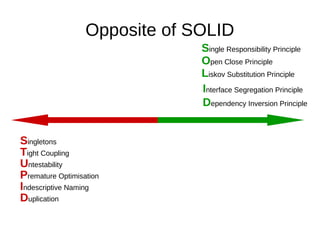The document discusses best practices for writing solid Java code, focusing on desirable code qualities, challenges in complexity, and the SOLID principles of object-oriented programming. It emphasizes modularization, low coupling, high cohesion, and the importance of abstraction in software design. Examples of applying these principles in coding practices are provided to illustrate concepts such as single responsibility, open/closed, and dependency inversion.
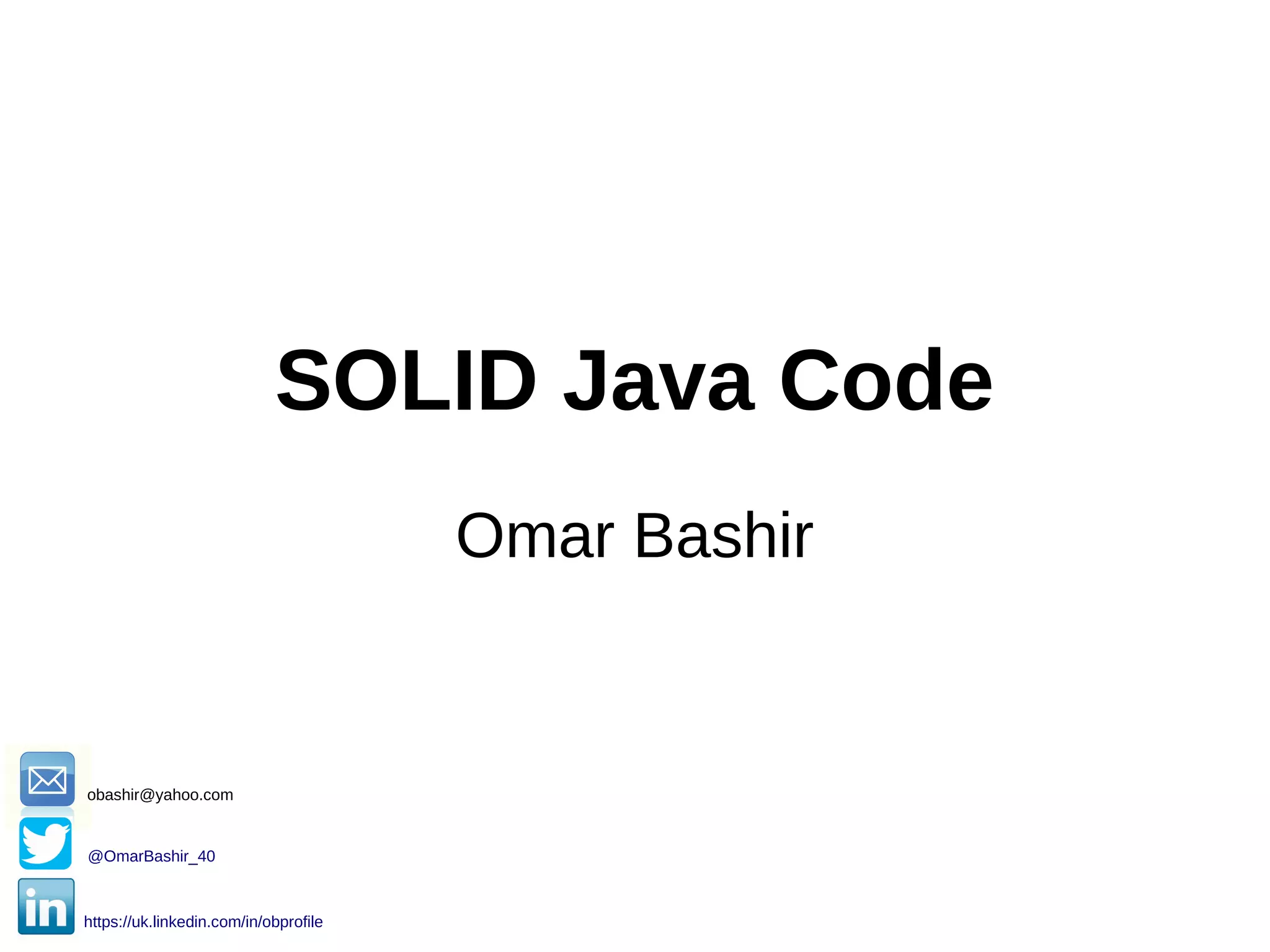
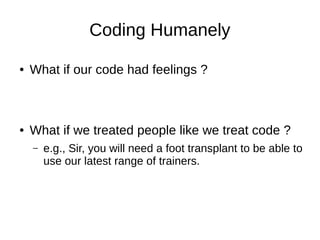
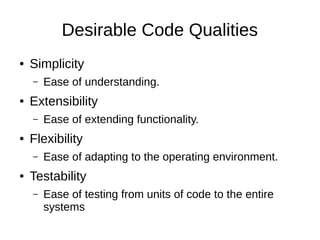
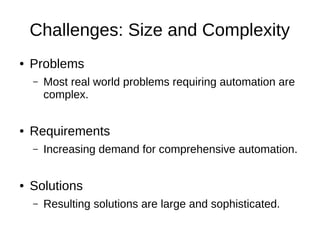

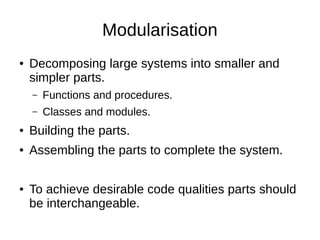
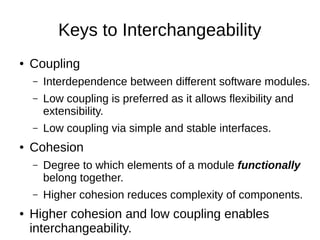
![Spot Issues ?
package app;
import calc.Calculator;
public class App {
public static void main(String[] args) {
String line = System.console().readLine();
String[] parts = line.split(" ");
Calculator.operand1 = Double.parseDouble(parts[0]);
Calculator.operator = parts[1].charAt(0);
Calculator.operand2 = Double.parseDouble(parts[2]);
Calculator.calculate();
}
}](https://image.slidesharecdn.com/solid-170201054845/85/SOLID-Java-Code-8-320.jpg)
![Spot Issues ?
package app;
import calc.Calculator;
public class App {
public static void main(String[] args) {
String line = System.console().readLine();
String[] parts = line.split(" ");
Calculator.operand1 = Double.parseDouble(parts[0]);
Calculator.operator = parts[1].charAt(0);
Calculator.operand2 = Double.parseDouble(parts[2]);
Calculator.calculate();
}
}
High Coupling](https://image.slidesharecdn.com/solid-170201054845/85/SOLID-Java-Code-9-320.jpg)
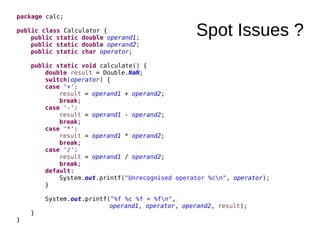
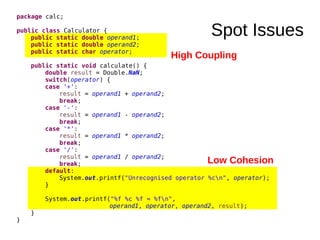
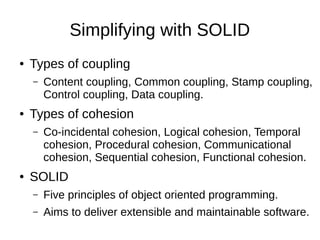
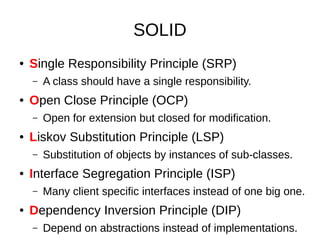
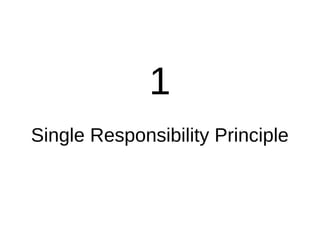
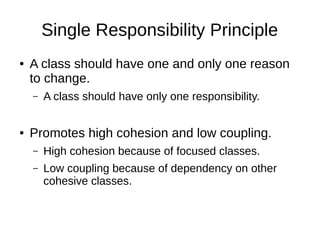
![Example
public class MeanCalculator {
public double calculate(final String data) {
double sum = 0.0;
final String[] parsedData = data.split(",");
for (String item : parsedData) {
sum += Double.parseDouble(item);
}
return sum/parsedData.length;
}
}](https://image.slidesharecdn.com/solid-170201054845/85/SOLID-Java-Code-16-320.jpg)
![Example
public class MeanCalculator {
public double calculate(final String data) {
double sum = 0.0;
final String[] parsedData = data.split(",");
for (String item : parsedData) {
sum += Double.parseDouble(item);
}
return sum/parsedData.length;
}
}](https://image.slidesharecdn.com/solid-170201054845/85/SOLID-Java-Code-17-320.jpg)
![Example
public class MeanCalculator {
public double calculate(final String data) {
double sum = 0.0;
final String[] parsedData = data.split(",");
for (String item : parsedData) {
sum += Double.parseDouble(item);
}
return sum/parsedData.length;
}
}
Two reasons to change
1. Parsing
2. Computation](https://image.slidesharecdn.com/solid-170201054845/85/SOLID-Java-Code-18-320.jpg)
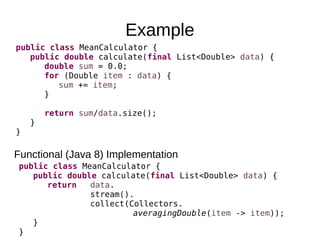
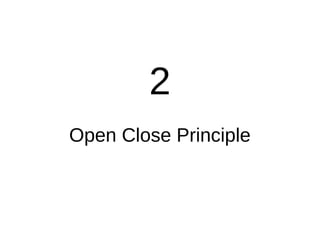
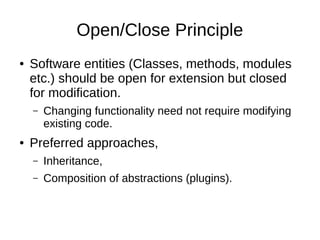
![Example
public class Parser {
List<Double> parse(final String data) {
final String[] parsedCsv = data.split(",");
return toDoubleList(parsedCsv);
}
private List<Double> toDoubleList(final String[] data) {
final List<Double> list = new ArrayList<>();
for(String item: data) {
list.add(Double.parseDouble(item));
}
return list;
}
}](https://image.slidesharecdn.com/solid-170201054845/85/SOLID-Java-Code-22-320.jpg)
![Example:Extendinga
ClosedParser
public class Parser {
public List<Double> parse(final String data, final Format format) {
String[] parsedData = null;
switch(format){
case CSV:
parsedData = data.split(",");
break;
case XML:
try {
parsedData = parseXml(data);
} catch (Exception exp) {
throw new IllegalArgumentException(exp);
}
break;
default:
throw new IllegalArgumentException(String.format("Unknown format %s", format));
}
return toDoubleList(parsedData);
}
/**
* Format: <DataList><Item>3</Item><Item>4.5</Item><Item>7.5</Item></DataList>
*/
private String[] parseXml(final String xmlString) throws Exception {
final Document xmlDoc = DocumentBuilderFactory.
newInstance().
newDocumentBuilder().
parse(new ByteArrayInputStream(xmlString.getBytes()));
final NodeList nodes = xmlDoc.getElementsByTagName("Item");
final String[] textList = new String[nodes.getLength()];
for (int i = 0; i < nodes.getLength(); i++) {
textList[i] = nodes.item(i).getTextContent().trim();
}
return textList;
}
private List<Double> toDoubleList(final String[] data) {
final List<Double> list = new ArrayList<>();
for(String item: data) {
list.add(Double.parseDouble(item));
}
return list;
}
}](https://image.slidesharecdn.com/solid-170201054845/85/SOLID-Java-Code-23-320.jpg)
![public List<Double> parse(final String data,
final Format format) {
String[] parsedData = null;
switch(format){
case CSV:
parsedData = data.split(",");
break;
case XML:
try {
parsedData = parseXml(data);
} catch (Exception exp) {
throw new IllegalArgumentException(exp);
}
break;
default:
throw new IllegalArgumentException(
String.format("Unknown format %s", format));
}](https://image.slidesharecdn.com/solid-170201054845/85/SOLID-Java-Code-24-320.jpg)
![Example: Opening With Template
Method
public abstract class Parser {
public List<Double> parse(final String data) {
final String[] parsedData = split(data);
return toDoubleList(parsedData);
}
protected abstract String[] split(final String data);
private List<Double> toDoubleList(final String[] data) {
final List<Double> list = new ArrayList<>();
for(String item: data) {
list.add(Double.parseDouble(item));
}
return list;
}
}](https://image.slidesharecdn.com/solid-170201054845/85/SOLID-Java-Code-25-320.jpg)
![Example: Parser Using Streams
public abstract class Parser {
public List<Double> parse(final String data) {
final String[] parsedData = split(data);
return Arrays.asList(parsedData).stream().
map(item -> Double.parseDouble(item)).
collect(Collectors.toList());
}
protected abstract String[] split(final String data);
}](https://image.slidesharecdn.com/solid-170201054845/85/SOLID-Java-Code-26-320.jpg)
![Example: Opening With Template
Method
public class CsvParser extends Parser {
@Override
protected String[] split(String data) {
return data.split(",");
}
}](https://image.slidesharecdn.com/solid-170201054845/85/SOLID-Java-Code-27-320.jpg)
![public class XmlParser extends Parser {
/**
* Format:
* <DataList><Item>3</Item><Item>4.5</Item><Item>7.5</Item></DataList>
*/
@Override
protected String[] split(String data) {
String[] textList = null;
try {
final Document xmlDoc = DocumentBuilderFactory.
newInstance().
newDocumentBuilder().
parse(new ByteArrayInputStream(data.getBytes()));
final NodeList nodes = xmlDoc.getElementsByTagName("Item");
textList = new String[nodes.getLength()];
for (int i = 0; i < nodes.getLength(); i++) {
textList[i] = nodes.item(i).getTextContent().trim();
}
} catch (Exception exp) {
throw new IllegalArgumentException(exp);
}
return textList;
}
}](https://image.slidesharecdn.com/solid-170201054845/85/SOLID-Java-Code-28-320.jpg)
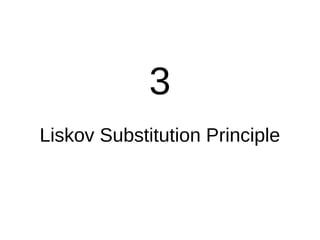
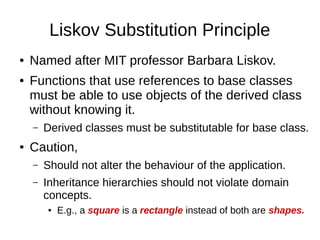
![public class AvergerApp {
public static void main(String[] args) {
final List<String> params = Arrays.asList(args);
if ((params.size() != 2) ||
(params.stream().filter(i -> i.contains("=")).count() != 2)) {
System.err.println("Parameters: f=<CSV/XML> m=<message>");
} else {
final String format = params.stream().
filter(str -> str.contains("f")).findFirst().get().split("=")[1];
final String message = params.stream().
filter(str -> str.contains("m")).findFirst().get().split("=")[1];
final Parser parser = getParser(format);
final List<Double> data = parser.parse(message);
final double avg = new MeanCalculator().calculate(data);
System.out.printf("Average(%s) = %f", data, avg);
}
}
private static Parser getParser(final String format) {
Parser parser = null;
switch (format) {
case "CSV":
parser = new CsvParser();
break;
case "XML":
parser = new XmlParser();
break;
default:
throw new IllegalArgumentException("Unknown format " + format));
}
return parser;
}
}](https://image.slidesharecdn.com/solid-170201054845/85/SOLID-Java-Code-31-320.jpg)
![public class AvergerApp {
public static void main(String[] args) {
final List<String> params = Arrays.asList(args);
if ((params.size() != 2) ||
(params.stream().filter(i -> i.contains("=")).count() != 2)) {
System.err.println("Parameters: f=<CSV/XML> m=<message>");
} else {
final String format = params.stream().
filter(str -> str.contains("f")).findFirst().get().split("=")[1];
final String message = params.stream().
filter(str -> str.contains("m")).findFirst().get().split("=")[1];
final Parser parser = getParser(format);
final List<Double> data = parser.parse(message);
final double avg = new MeanCalculator().calculate(data);
System.out.printf("Average(%s) = %f", data, avg);
}
}
private static Parser getParser(final String format) {
Parser parser = null;
switch (format) {
case "CSV":
parser = new CsvParser();
break;
case "XML":
parser = new XmlParser();
break;
default:
throw new IllegalArgumentException("Unknown format " + format));
}
return parser;
}
}](https://image.slidesharecdn.com/solid-170201054845/85/SOLID-Java-Code-32-320.jpg)
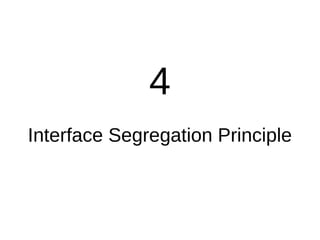
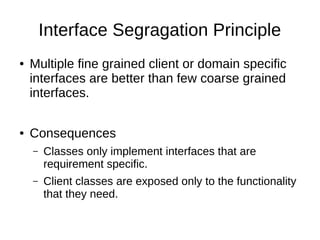
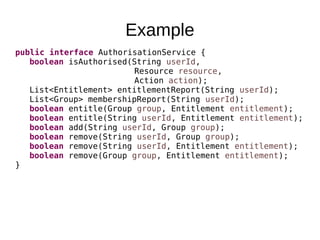
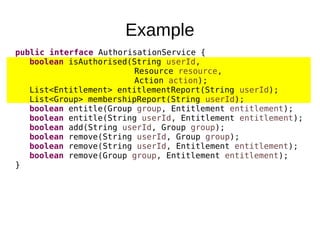
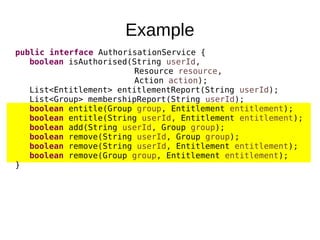
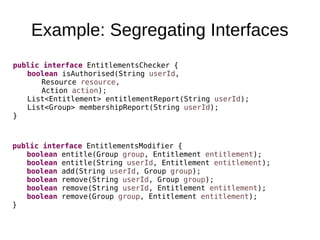
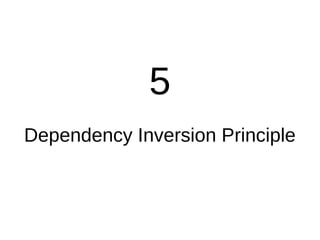
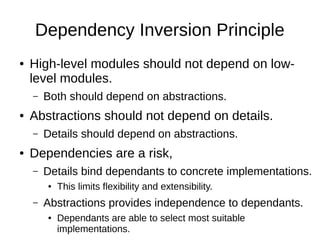
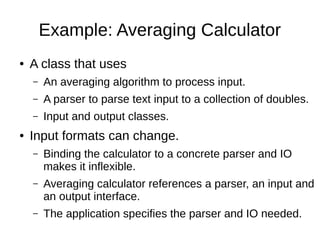
![Example: Parser
public interface IParser {
List<Double> parse(final String data);
}
public abstract class Parser implements IParser {
public List<Double> parse(final String data) {
final String[] parsedData = split(data);
return Arrays.asList(parsedData).stream().
map(item -> Double.parseDouble(item)).
collect(Collectors.toList());
}
protected abstract String[] split(final String data);
}](https://image.slidesharecdn.com/solid-170201054845/85/SOLID-Java-Code-42-320.jpg)
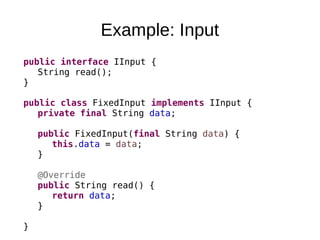
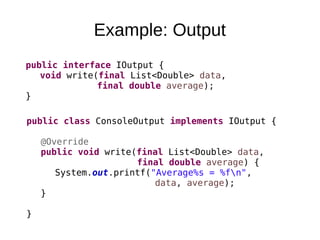
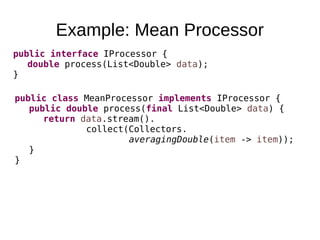
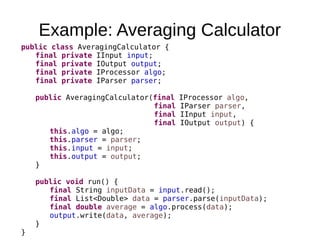
![Example: CSV Averaging App
public class CsvAveragingApp {
public static void main(String[] args) {
final IInput input = new FixedInput(args[0]);
final IOutput output = new ConsoleOutput();
final IParser parser = new CsvParser();
final IProcessor algo = new MeanProcessor();
final AveragingCalculator calc =
new AveragingCalculator(algo,
parser,
input,
Output);
calc.run();
}
}](https://image.slidesharecdn.com/solid-170201054845/85/SOLID-Java-Code-47-320.jpg)
![Example: XML Averaging App
public class XmlAveragingApp {
public static void main(String[] args) {
final IInput input = new FixedInput(args[0]);
final IOutput output = new ConsoleOutput();
final IParser parser = new XmlParser();
final IProcessor algo = new MeanProcessor();
final AveragingCalculator calc =
new AveragingCalculator(algo,
parser,
input,
output);
calc.run();
}
}](https://image.slidesharecdn.com/solid-170201054845/85/SOLID-Java-Code-48-320.jpg)

